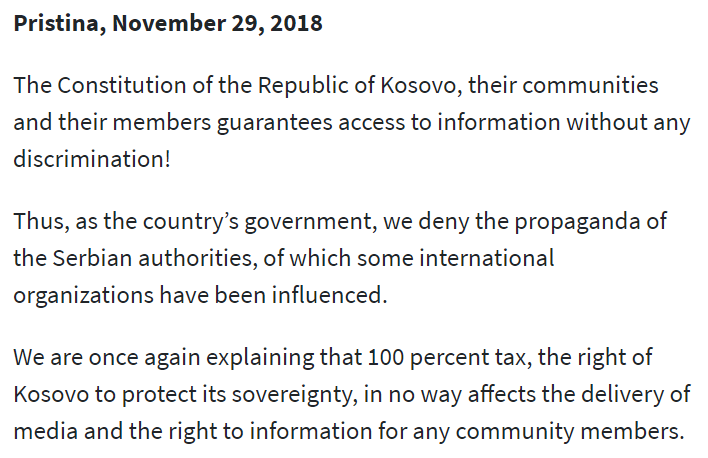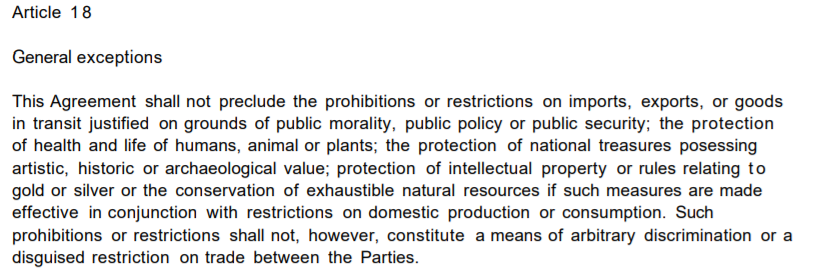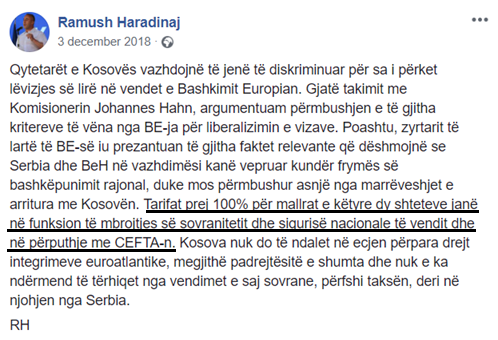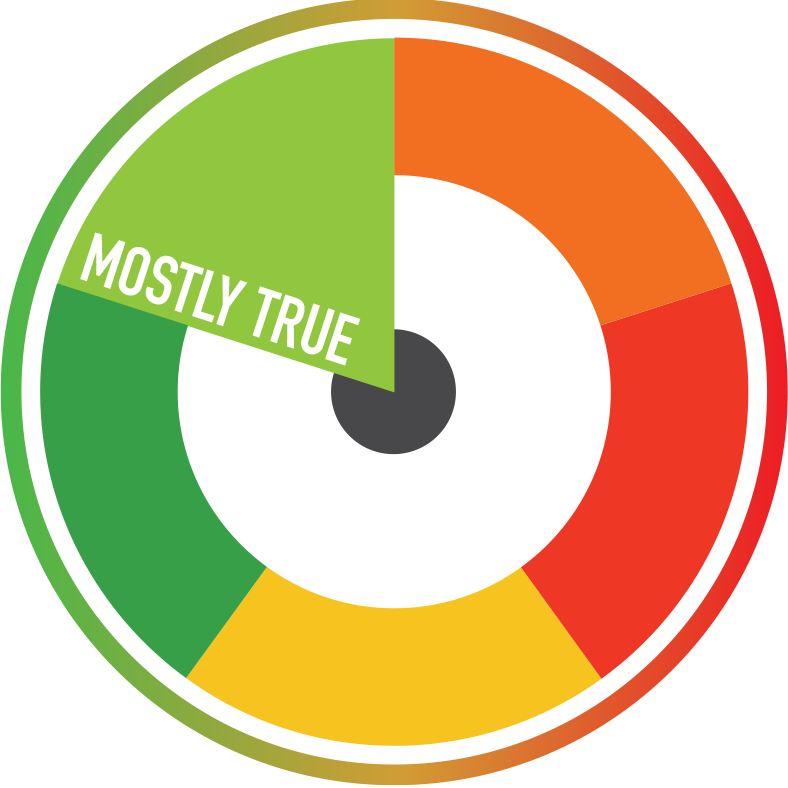The Dutch newspaper Trouw published an article on February 1st about import tariffs of 100 percent on Serbian products like milk. According to Trouw, this is problematic, since the imposed tariffs are – according to the EU – a direct violation of the regional Central European Free Trade Agreement (CEFTA). Our findings suggest this is mostly true.
This claim is based on a statement of Maja Kocijancic, spokeswoman of the EU’s foreign policy chief Mogherini. According to a Reuters article from November 7th , she said: “These measures (the import tariffs, ed.) are a clear violation of Kosovo’s obligations under CEFTA.” Also, on December 19th, the European Commission answered a parliamentary question on that subject as follows: ‘the decisions of the Kosovo government to increase up to 100% the tax on goods from Serbia … are a clear violation of CEFTA.’

This recent disagreement between the EU and Kosovo is surprising. Only last summer, the Union initiated talks between the decade-old country and neighbour Serbia, that still considers Kosovo as a southern province rather than an independent state. Also, Kosovo’s capital Pristina hosted the CEFTA Week last December – an event to discuss the state of the trading agreement in a changing world economy.
Import tariffs
But, why are there tariffs on Serbian goods? In November, Kosovo’s government imposed the import tariffs of 10 and later 100 percent on Serbian products after the country’s bid to join Interpol failed. Immediately after the failed attempt, Kosovo’s government stated that a ‘fierce campaign of the Republic of Serbia once again proved its character against Kosovo and against the idea of normalizing relations with the Republic of Kosovo’. So, according to the government, Serbia actively lobbied against the attempt to become an Interpol member.
Kosovo’s Prime Minister Ramush Haradinaj has stated that he will only lift the tariffs when Serbia finally recognizes Kosovo as an independent state.
CEFTA
According to EU spokeswoman Kocijancic, the imposed tariffs are a ‘clear violation’ of the CEFTA trade agreement between Bosnia & Herzegovina, Serbia, Montenegro, Kosovo. Macedonia, Albania and Moldova; all countries that aspire EU membership in the near future.
The trade agreement was set up for former communist countries, so they could harmonize their economic and legal systems with EU demands. Since its creation in 1992, countries like Hungary and Romania left the agreement after they acquired full EU membership.
Customs and tariffs
The CEFTA trade agreement is an extensive document consisting of an original agreement signed in 1992 and multiple amendments, the most recent dating from 2006. In this last amendment, called ‘CEFTA 2006’, the member countries are bound by articles concerning customs for importing and exporting products. One of the aims of the trade agreement is ‘the simplification and facilitation of customs procedures’, which is in accordance with Article 14.4 of the agreement. A subcommittee ensures that ‘Parties shall reduce, as far as possible, the formalities imposed on trade’, as stated in the Article.
The original agreement, signed in 1992 in Poland, states clearly in Article 5 that ‘no new charge having an effect equivalent to a customs duty on imports shall be introduced in trade between the Parties.’

According to the Business Directory, duties are introduced to ‘raise state revenue or to protect domestic industries from more efficient or predatory competitors from abroad’. Haradinaj and his government stated that the recent tariffs are not only used to ‘protect local goods’, but they also serve as protection for their sovereignty:

Based on these statements, Kosovo’s import taxes on Serbian products have an effect similar to that of a customs duty.
National security
In spite of the aforementioned Articles, Prime Minister Haradinaj states that his government is on the right side of the argument. Article 18 of the original 1992 version of CEFTA says that the ‘agreement shall not preclude the prohibitions or restrictions on imports, exports, or goods in transit justified on grounds of public morality, public policy or public security.’

This basically means that the government of Kosovo can put tariffs in place if they think the security of the country and its people are in danger. On December 3, Haradinaj stated on his Facebook page that the tariffs ‘have the function of protecting national sovereignty and national security and are in compliance with CEFTA.’

Conclusion
This discussion doesn’t seem to have a clear winner. It is not clear whether the argument of Haradinaj and his government, that Kosovo needs to be protected from ‘continuing obstacles that Serbia is making to our country’, will hold. Since the Serbian government already demanded the organization behind CEFTA to resolve the ‘tax problem’ in November, it is still not known which action can be taken. In the meantime, Serbia threatens to start a legal process in an arbitration court if CEFTA fails to end the trade conflict.
So in the end, the question if Kosovo is in violation of the agreement might only be answered in an arbitration court in the near future. But, based on the Articles in CEFTA that promote free trade we conclude that the claim is mostly true.
Leave your comments, thoughts and suggestions in the box below. Take note: your response is moderated
RESEARCH | ARTICLE © Matthijs Keim, Fontys University of Applied Sciences, Tilburg, NL





